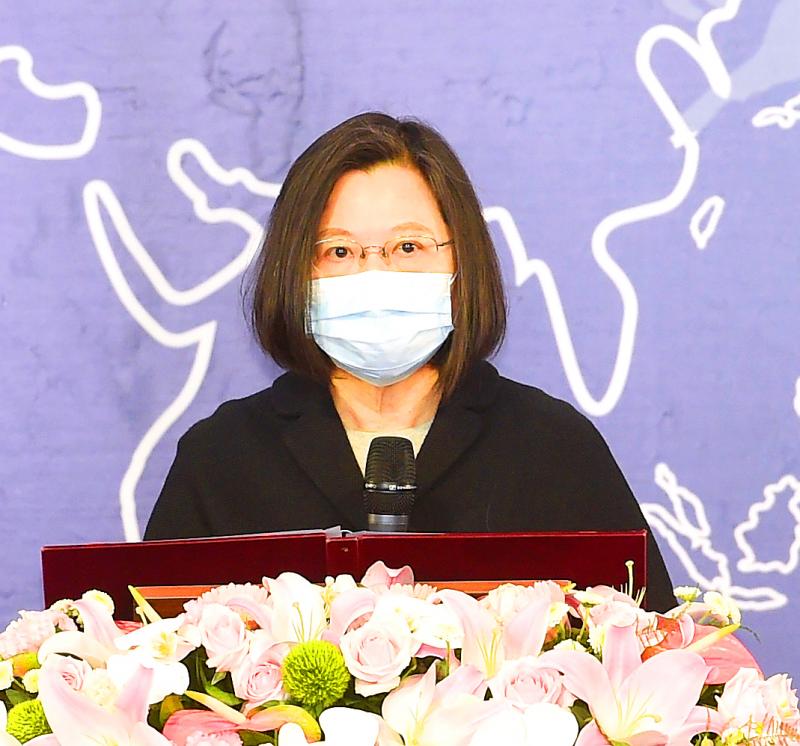Taiwan has made considerable progress in improving its human rights situation, President Tsai Ing-wen (蔡英文) said yesterday at an event marking World Human Rights Day on Thursday, with victims of political persecution among the audience.
The ceremony took place at the National Human Rights Museum and the Jing-Mei White Terror Memorial Park in New Taipei City, which was formerly a prison run by the Taiwan Garrison Command to incarcerate political dissidents.
“Taiwan has seen concrete progress in transitional justice in the past few years. People from across generations have joined the effort, achieving positive results for transitional justice, as well as to strive for more vigorous protection of human rights. These will ensure that our freedom and democracy will last into the future,” Tsai said.

Photo: Fang Pin-chao, Taipei Times
“These efforts and progress can help us face the suffering and agony of the past, and resolve to never repeat history. Then we can join together to advance forward and build a common future,” she added.
Tsai listed her administration’s accomplishments in carrying out transitional justice, such as the establishment of the Transitional Justice Commission to investigate past institutional abuses and atrocities against people to restore justice and truth, overturn wrongful convictions against victims, and disclose secret government files.
Tsai pointed to the establishment of the National Human Rights Museum two years ago to promote human rights education and document Taiwan’s progress from authoritarianism to a democratic society.
“People can see the positive results of human rights education, and also exhibits and research work at the museum. It has undertaken multifaceted programs to combine arts, literature, music and other forms to disseminate the concept of human rights in people’s daily lives,” she said.
Tsai also lauded the establishment of the National Human Rights Commission on Aug. 1, an independent agency of the Control Yuan that is tasked with probing rights violations, reviewing the implementation of human rights policies and presenting national reports on human rights.
Control Yuan President Chen Chu (陳菊) was previously a victim of political persecution, so she has empathy for the victims and their families, and for their burden of pain and pressure, Tsai said, adding: “Under Chen Chu’s leadership, I believe the commission can strengthen the protection of human rights, and pass [it] on to our future generations.”
In her address, Chen said she wants to “thank the many respected elders and victims of political persecution who came before me, because they refused to succumb under the past authoritarian one-party state. It is they who enabled Taiwan to have the energy to fight for our freedom and democracy.”
“To them and their families who suffered together, we are grateful for their agony and sacrifice — they helped make Taiwan a land of beauty and freedom — and for attaching great importance to human rights protection,” Chen said.

MAKING WAVES: China’s maritime militia could become a nontraditional threat in war, clogging up shipping lanes to prevent US or Japanese intervention, a report said About 1,900 Chinese ships flying flags of convenience and fishing vessels that participated in China’s military exercises around Taiwan last month and in January last year have been listed for monitoring, Coast Guard Administration (CGA) Deputy Director-General Hsieh Ching-chin (謝慶欽) said yesterday. Following amendments to the Commercial Port Act (商港法) and the Law of Ships (船舶法) last month, the CGA can designate possible berthing areas or deny ports of call for vessels suspected of loitering around areas where undersea cables can be accessed, Oceans Affairs Council Minister Kuan Bi-ling (管碧玲) said. The list of suspected ships, originally 300, had risen to about

DAREDEVIL: Honnold said it had always been a dream of his to climb Taipei 101, while a Netflix producer said the skyscraper was ‘a real icon of this country’ US climber Alex Honnold yesterday took on Taiwan’s tallest building, becoming the first person to scale Taipei 101 without a rope, harness or safety net. Hundreds of spectators gathered at the base of the 101-story skyscraper to watch Honnold, 40, embark on his daredevil feat, which was also broadcast live on Netflix. Dressed in a red T-shirt and yellow custom-made climbing shoes, Honnold swiftly moved up the southeast face of the glass and steel building. At one point, he stepped onto a platform midway up to wave down at fans and onlookers who were taking photos. People watching from inside

Japan’s strategic alliance with the US would collapse if Tokyo were to turn away from a conflict in Taiwan, Japanese Prime Minister Sanae Takaichi said yesterday, but distanced herself from previous comments that suggested a possible military response in such an event. Takaichi expressed her latest views on a nationally broadcast TV program late on Monday, where an opposition party leader criticized her for igniting tensions with China with the earlier remarks. Ties between Japan and China have sunk to the worst level in years after Takaichi said in November that a hypothetical Chinese attack on Taiwan could bring about a Japanese

STREAMLINED: The dedicated funding would allow the US to transfer equipment to Taiwan when needed and order upgraded replacements for stockpiles, a source said The US House of Representatives on Thursday passed a defense appropriations bill totaling US$838.7 billion, of which US$1 billion is to be allocated to reinforcing security cooperation with Taiwan and US$150 million to replace defense articles provided to the nation. These are part of the Consolidated Appropriation Act, which the US House yesterday passed with 341 votes in favor and 88 against. The act must be passed by the US Senate before Friday next week to avoid another government shutdown. The US House Committee on Appropriations on Monday unveiled the act, saying that it allocates US$1 billion for the Taiwan Security Cooperation Initiative